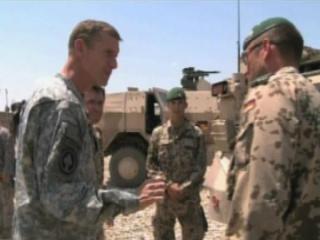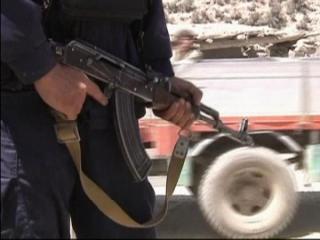WASHINGTON — The prospect that U.S. Army Gen. Stanley McChrystal may ask for as many as 45,000 additional American troops in Afghanistan is fueling growing tension within President Barack Obama's administration over the U.S. commitment to the war there.
On Monday, McChrystal sent his assessment of the situation inAfghanistan to the Pentagon , the U.S. Central Command, the Joint Chiefs of Staff and NATO . Although the assessment didn't include any request for more troops, senior military officials said they expect McChrystal later in September to seek between 21,000 and 45,000 more troops. There currently are 62,000 American troops in Afghanistan .
However, administration officials said that amid rising violence and casualties, polls that show a majority of Americans now think the war in Afghanistan isn't worth fighting. With tough battles ahead on health care, the budget and other issues, Vice President Joe Biden and other officials are increasingly anxious about how the American public would respond to sending additional troops.
The officials, who spoke on the condition of anonymity because they weren't authorized to talk to the media, said Biden has argued that without sustained support from the American people, the U.S. can't make the long-term commitment that would be needed to stabilize Afghanistan and dismantle al Qaida . Biden's office declined to comment.
"I think they (the Obama administration) thought this would be more popular and easier," a senior Pentagon official said. "We are not getting a Bush-like commitment to this war."
Monday's assessment initially was to include troop recommendations, but political concerns prompted White House and Pentagon officials to agree that those recommendations would come later, advisers to McChrystal said. Although the White House took a hands-off approach toward Afghanistan earlier this summer, Pentagon officials said they're now getting more questions about how many troops might be needed and for how long.
Some White House officials said the administration feels it was pressured to send the additional 17,500 combat troops and 4,000 trainers earlier this year, before the administration was comfortable with its plan for Afghanistan , because of the country's election in August.
Obama now feels that McChrystal and his superior, Army Gen. David Petraeus , the head of the Central Command, are pressuring him to commit still more troops to Afghanistan , a senior military official said. The official said that retired Marine Gen. James Jones , Obama's national security adviser, told McChrystal last month not to ask for more troops, but that McChrystal went ahead anyway and indicated in interviews that he may need more.
McChrystal's new assessment is the fifth one ordered since Obama's inauguration. Pentagon spokesman Bryan Whitman said that no details of the assessment would be released. Other officials called it a "political hot potato."
Advisers to McChrystal, who spoke to McClatchy on the condition of anonymity because of the matter's sensitivity, said the document is just over 10 pages and broadly spells out McChrystal's assessment of conditions on the ground:
"It says that this could get much worse unless we invest ourselves in this now," one adviser said. "Then it says, 'This is what we propose to do.'"
On Monday, White House Press Secretary Robert Gibbs said that the Obama administration inherited an under-resourced war in Afghanistan , but he stopped short of promising more troops.
Administration officials said that the White House is planning a series of "quiet discussions" among top advisers over the next six weeks or so about the way ahead.
"What the president is going to want to do is review the report and then discuss and talk with all of those that have equities in it to get their viewpoints and to ensure that each and every person is heard on this, and that's what the president intends to do," Gibbs said Monday.
McChrystal's latest assessment calls for redistributing troops to focus more on protecting population centers and less on chasing Taliban fighters. It also says it will take several years to build a more professional and capable Afghan security force, without saying how large that force should be.
The assessment also calls for more U.S. government civilians to be sent to Afghanistan and for the streamlining of the military's command structure, saying that too much bureaucracy is making it difficult for commanders to make decisions on the ground.
"The situation in Afghanistan is serious, but success is achievable and demands a revised implementation strategy, commitment and resolve, and increased unity of effort," McChrystal said in a statement Monday.
Since Obama's inauguration, when the war was hailed as a just cause, the administration has been bombarded by signs of a deteriorating situation.
The deaths of 304 U.S. and NATO forces, including 179 Americans, so far this year makes 2009 the deadliest year for both U.S. and NATO forces since the war began eight years ago — and there are still four months to go.
A Washington Post-ABC News poll released in August found that for the first time since the war began, a majority of Americans don't think the war is worth fighting.
Pentagon officials said that White House officials have told them they fear that McChrystal's expected request for more troops won't be his last.
The additional troops are "only a down payment on what would be required to turn things around, and everyone knows that," said another senior military official, who said that's true in part because estimates of what the Afghan forces can do and when they'll be fully capable of handling security threats are being downgraded.
Meanwhile, U.S. military commanders in Kabul feel the political clock ticking, saying they think they have no more than 18 months to show some kind of progress, even as most agree that they don't have enough troops.
Success could mean as little as making the levels of violence plateau, two military officials told McClatchy .
Pentagon spokesman Geoff Morrell said any discussion about what the Pentagon is proposing and the White House response is premature.
"We are not there yet," Morrell said. "Let's see what Gen. McChrystal comes back and asks for.


















